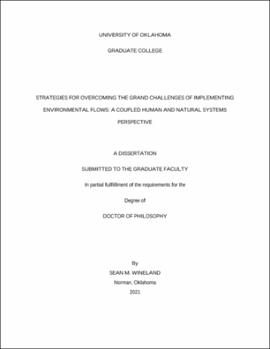| dc.contributor.advisor | Neeson, Thomas | |
| dc.contributor.author | Wineland, Sean | |
| dc.date.accessioned | 2022-02-08T16:20:34Z | |
| dc.date.available | 2022-02-08T16:20:34Z | |
| dc.date.issued | 2022-05-17 | |
| dc.identifier.uri | https://hdl.handle.net/11244/334572 | |
| dc.description.abstract | Global declines in freshwater biodiversity and the ecosystem services freshwater ecosystems provide have prompted a call for accelerated and expanded implementation of conservation interventions to bend the curve on these losses. Environmental flows are recognized as a powerful freshwater conservation tool to boost biodiversity and ecosystem services through targeted water releases from dams, however widespread implementation is lacking. Because implementing environmental flows requires careful planning and consideration of both humans and nature, there are many challenges conservation planners face as they attempt to boost implementation. The research presented in this dissertation aims to provide strategies to overcome the challenges facing environmental flows implementation by conceptualizing and modeling environmental flows as a coupled human and natural system. The first project presented a conceptual framework to identify locations with both high biodiversity value and conservation feasibility to target for e-flows implementation across future climate uncertainty. Despite climate uncertainty, some locations were identified as high conservation priority. This research suggests that despite significant conservation planning challenges, environmental flows can still be implemented, and offers a conservation planning framework that can be used in other settings. The second project tested different simulated scenarios in an incentive-based Payment for Ecosystem Services (PES) water conservation initiative to identify tradeoffs between equity and conservation outcomes. This research found that aiming for an equitable distribution of payments to reduce water consumption and reallocate that water to environmental flows does not result in large tradeoffs to conservation outcomes. This research suggests that prioritizing equity does not sacrifice conservation outcomes and provides a framework for testing equity tradeoffs in PES schemes. The third project surveyed water decision-makers to identify their perspectives on the barriers and data needs to implementing environmental flows. This research found that despite decision makers’ different perspectives on future water conditions, they identified the same barriers and data needs. This research suggests that cooperation on complex human-environmental problems could happen despite strongly held values and beliefs that might otherwise inhibit implementation. The fourth project tested whether targeting influential individuals in conservation networks as early adopters of an environmental flows initiative would boost overall adoption. This research found robust results that targeting influential individuals boosted overall adoption across spatial scales and information diffusion models. This research suggests that to help accelerate and expand environmental flows initiative adoption, influential individuals should be targeted as early adopters. The results presented in this dissertation contribute to current high-priority research efforts in conservation science that aim to help bend the curve on freshwater biodiversity loss by accelerating and expanding the implementation of environmental flows. Overall, considering the needs of both people and nature is key to successful environmental flows implementation. | en_US |
| dc.language | en_US | en_US |
| dc.subject | Conservation | en_US |
| dc.subject | Water Management | en_US |
| dc.subject | Environmental Flows | en_US |
| dc.subject | Coupled Human and Natural Systems | en_US |
| dc.title | Strategies For Overcoming the Grand Challenges of Implementing Environmental Flows: A Coupled Human and Natural Systems Perspective | en_US |
| dc.contributor.committeeMember | McPherson, Renee | |
| dc.contributor.committeeMember | Allen, Daniel | |
| dc.contributor.committeeMember | Hoagland, Bruce | |
| dc.contributor.committeeMember | Vaughn, Caryn | |
| dc.date.manuscript | 2022-02-02 | |
| dc.thesis.degree | Ph.D. | en_US |
| ou.group | College of Atmospheric and Geographic Sciences::Department of Geography and Environmental Sustainability | en_US |
| shareok.orcid | 0000-0003-3548-1927 | en_US |
